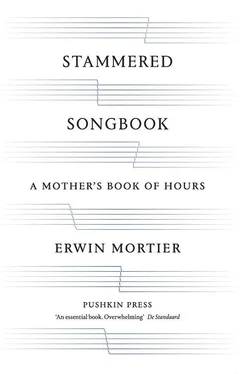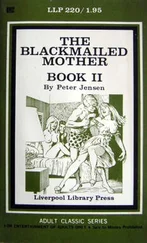We heard that you could no longer take a shower by yourself. That he took you with him, lathered you and held you tight when you were frightened by the water coming out of the showerhead.
It took you about two hours to calm down when everyone arrived in the house that one of my sisters had rented. Upset by the commotion of playing children, laughter, pleasure, you went upstairs, where it was quiet. You used to be in charge, and let all that exuberant life wash over you. Now you crept away, behind my father.
She’s like my shadow these days, he said.

And now you are a blue-veined china doll. You no longer wear tights but thick woollen socks. The winter bends your fingers into small, cold claws. In your footwear your toes curl against your soles. So your slow withering begins. Winter after winter you become a little more bent, you contract around yourself, under the increasingly thick sweaters and coats with which we try to keep you warm — one great vanishing point.

I shall have to restrain her, he says. Otherwise I’ll never have a moment’s rest. I can’t be everywhere at once. And if she gets into the drawers and grabs for a knife or breaks a glass… She doesn’t know what a knife is any more, or slivers of glass, how sharp they are. I’ve applied for a wheelchair from the Health Service. Then I shall restrain her, there’s nothing else for it.

Eventually your system will have become too weak to resist infections. A wealth of clinical terms will run riot over your bones. Your blood pressure is already beginning to drop worryingly, and you sometimes lose consciousness in your sleep. It is as if reverse birth pangs are passing through your cells and each wave is taking something else of you with it. Your insides rattle and jangle. The winter may bring the final bout of pneumonia. One day you may no longer have any appetite. You may have a fall, break something, and mess up your dislocated head even more. How far should we go to keep you alive? When does care become another word for torture?
You won’t notice a thing. Whatever awareness or consciousness is still dormant in you, a frightened owl chick somewhere in the tangle of collapsed beams in your head, will glide away into the fog of morphine — we hope.

I wouldn’t like her to lie there suffering later, he says.
I wouldn’t want her to be dying and us to be just standing there watching.
I don’t think she has to suffer.
We can arrange it, I say.
The doctor said so too. A moment will come when we all feel something has to be done.
You can’t determine that moment in advance, there’s no point.
But it will come, and everyone will realize: it’s time.

The most probable outcome? That she’ll become increasingly bedridden and one morning won’t get up. That she’ll sink into a coma. That she will lose still more weight, until she is all skin and bone. That her brain function will decline still further, that constant light tremors will pass through her limbs.
That her immune system will decline and she will eventually be given mush containing antibiotics. That she will lie there with the corners of her mouth twitching, that her eyeballs will tremble, that her whole body will be on the rocks.
Hopeful complications: that one day she may no longer feel any hunger. That we keep her fluid levels up, but decide no longer to feed her.
That her heart may give out, before the decline is total.

Mum, I remember I rang you the evening before you had to go in for surgery, years ago. Five top-heavy children and one miscarriage had played havoc with your body. At fifty-five you were threatening to become completely incontinent. The doctors had just come up with an ingenious system, a kind of artificial sphincter that you could operate with a button in your groin. It was to be a long procedure. Physicians from other hospitals would come and look on with fascination while you were splayed on the tilted operating table and that revolutionary technology was implanted in you.
I still wonder: is that when it began? The long period under anaesthesia? In a journal from Harvard I read, as the article puts it in clinical terms, “the formation of beta-amyloids was observed in brain cells in petri dishes to which components of the major anaesthetics were added”.
I keep the article, but don’t read any further.
I rang you that evening. The nurses had given you an enema, but had taken no account of the fact that you couldn’t possibly retain any liquid. There was a commotion, swearing, the clatter of buckets. Everything’s filthy, the floor, the sheets, you said. Call me back in a little while.
I remember thinking: if she is to be old, Death, grant her dignity. It was all so far off, I thought.
Less than ten years later there’s no point any more. You’ve long since forgotten how to use that button. You’ve long since forgotten that you’re a mother and I’m your son.
To the hospital with a woman who has to undergo an operation but no longer knows who she is, where she is or what will happen.
She cries like a schoolgirl on the trolley taking her to the operating theatre, calls with arms outstretched “Come, come, Dad” to my father, who watches her go with his heart breaking.
No learned spectators this time. Just the surgeon who has to undo his own work.
She comes back with a belly with rubber pipes sticking out of it and above her hip a hole from which a plastic bag hangs, which must be replaced twice a day, incorporating a pink rubber ring, which must be cleaned carefully.

In the future will I think, whenever I see an elderly lady with your posture, or with features that more or less resemble yours: you could have been like that, if you’d reached eighty-five?
How would you have grown old if the illness hadn’t been there? On your side of the family there was nothing straightforward, rough or easy-going about old age. It was tough and bony. It bit on crumbling teeth, like your father and grandfather.
On father’s side dying was welcomed fatalistically. To which side will I incline in old age, dying? Rather the rounded, gentle stoicism of my father, if I were to have a say in it. But do we have the choice? How great is the play between the dictates of the organism that is ours but there again not ours? How many of our decisions are conclusions based on the body, or attempts to avoid those conclusions?
I’m frightened of getting old, you said quite often, I remember, when you were in your forties. And also frightened of death, dying. Around your washbasin there was always a regiment of anti-wrinkle creams and breast-firming ointments. I should have liked to see you grow old the way your great-aunt grew old, ninety-six when she died. Smoked a fat cigar every evening and poured a stiff whisky into her body, which was the shape of a carpenter’s square. At family gatherings she preferred to sit at the young people’s table. Making quips and meanwhile observing all that young life with her one eye, whose vision had still not grown hazy. One evening she said that the whisky was upsetting her stomach. Before the GP could be called she was dead. Sitting up in bed, hands on her belly.
Читать дальше













